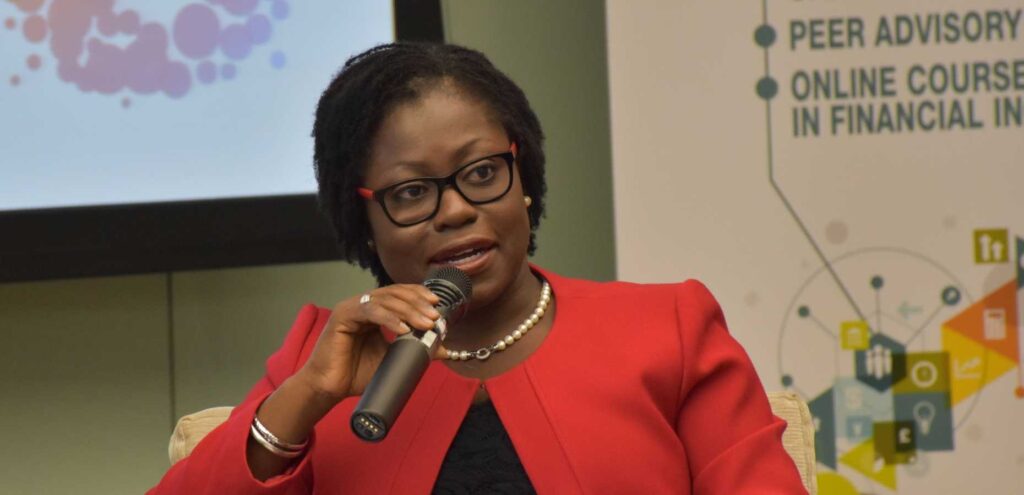By Elsie Addo Awadzi, Chair, AFI Gender Inclusive Finance Committee
During 2023, the Gender Inclusive Finance Committee (GIFC) witnessed how substantial progress has been made in advancing women’s financial inclusion through gender responsive financial policy and regulation.
AFI’s most recent policy change survey revealed that at least 60 policy and regulatory changes relating to Gender Inclusive Finance (GIF) have now been implemented by AFI members since the workstream was formalized through the adoption of the Denarau Action Plan in 2016. It is therefore not surprising that according to the World Bank’s Global Findex 2021, the gender gap in access to finance in the developing world narrowed to 6% in 2021, after having remained at 11 % from 2011.

Bank of Ghana’s Deputy Governor and Chair of the Gender Inclusive Finance Committee Elsie Awadzi
More and more AFI members are setting GIF-related Maya Declaration commitments. Examples include Fiji’s commitment to increase women’s access to formal accounts from 78% in 2021 to 83% by 2027, the National Bank of Rwanda’s commitment to onboard 15,000 rural women to mobile money use in a year, and State Bank of Pakistan’s commitment to reducing the gender gap from 35% to 25% by 2028.
In January, we were delighted to welcome Senegal’s General Delegation for Rapid Entrepreneurship of Women and Youth (DER/FJ) as a new AFI member. You can discover how digitalization is allowing DER/FJ to reach women entrepreneurs across Senegal in this short video. Also in January, AFI published a report detailing how our members managed to protect and promote women’s financial inclusion during the COVID pandemic.
February saw the launch of the AFI Policy Framework for Women-led MSME Access to Finance, which sets out how financial regulators can boost financial inclusion for this vital group. This year, AFI published stories about efforts to support female entrepreneurs in Malaysia and Madagascar.
In March, members of the GIFC came together to celebrate International Women’s Day with a video on the opportunities digital financial services present for women’s increased financial inclusion and the importance of supporting them with financial education.
In April, AFI published a report on gender diversity and women’s leadership within AFI member institutions. There were ten women heads and 39 deputy heads of institutions (including central banks, financial regulatory authorities, and others) in 2022, compared to seven heads and 31 deputy heads in 2018. While the increase is welcome, there is clearly still work to do, and the same month AFI published a Toolkit for Increasing Gender Diversity and Women’s Leadership in Financial Regulatory Institutions.
In July, AFI published a Gender-Sensitive Rapid Response and Crisis Recovery Policies toolkit, aimed at helping policymakers and financial system regulators to develop crisis responses, gender-sensitive policies, and regulations to address crises that disrupt social and economic activities which could further widen the gender gap in financial inclusion.
In September, seven AFI members were awarded GIF Ambassador status during the AFI Global Policy Forum held in Manilla, in recognition of their efforts to advance women’s financial inclusion. Congratulations to our new GIF Ambassadors, Bank of Sierra Leone, Reserve Bank of Vanuatu, National Bank of Tajikistan, Central Bank of Solomon Islands, Bank of Papua New Guinea, Bank of Namibia and Bank Negara Malaysia!
A High-Level breakfast meeting on Women’s Leadership and Institutional Diversity in the AFI network was also held at the GPF, attended by 39 AFI leaders (22 female and 17 male). The event rallied commitments towards greater inclusion of women as users, providers, and regulators of financial services, while adopting strategies to intentionally build a pipeline of capable women leaders in regulatory institutions.
Also during the GPF, AFI and the African Development Bank launched a major, four-year partnership to close the finance gap for women entrepreneurs in Africa. Malado Kaba, Director of the Gender, Women and Civil Society Department at AfDB, shared her views on how to improve access to finance for African women-led MSMEs here.
During the World Bank/IMF Annual meetings in October, at an event about women’s leadership and diversity hosted by Bank al Maghrib and Bank of Spain, AFI Executive Director Dr Alfred Hannig stressed the importance of male allies in supporting women’s financial inclusion, promoting institutional diversity, and developing a strong pipeline of future women leaders.
The sheer volume of GIF-related policy changes, commitments, knowledge products and dialogues in 2023 highlights that gender is at the very top of our members’ concerns. AFI continues to help improve awareness and understanding of the barriers and enablers of GIF, including through its groundbreaking GIF Mapping Project, and ongoing work on a GIF Policy Model to help members to improve on the design and implementation of GIF-related reforms.
While encouraging progress is being made across the network, we must not relent until every woman can access and use safe, affordable, quality financial services. This will improve socio-economic outcomes for the developing world, while promoting greater stability and resilience in the global financial system.
The AFI Gender Inclusive Finance Committee provides high-level strategic guidance to the AFI GIF team. Its current members represent Bank of Ghana (Chair), Bangladesh Bank (Vice-Chair), Banco Central del Paraguay, Bank Al-Maghrib Morocco, Palestine Monetary Authority, Bank of Uganda, and Reserve Bank of Zimbabwe.

 About
About
 Online
Online
 Data
Data



















